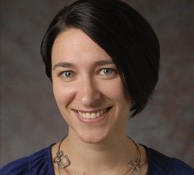Despite biases, many strive to maintain family bonds

“I was surprised to find that many of the grandparents who didn’t have positive perceptions of homosexuality were nonetheless fiercely supportive of their grandchild,’’ said Kristin Scherrer, an assistant professor in the School of Social Work who has worked with LGBT clients and their families.
Scherrer also found that grandparents may be more accepting than parents when children are open about their sexual orientation.
“It poses more of a conflict sometimes for parents, because it bears more directly on them and they’re more likely to think of it as their ‘fault,’’’ says Scherrer.
Grandparents, in contrast, often take it upon themselves to help smooth things over with other family members -- including parents. By signaling their acceptance, they also made it easier for the extended family to accept an LGBT family member. “The grandparents really did a lot of work to keep order within the family system as a whole and make it a friendly environment,’’ said Scherrer.
One grandparent told Scherrer, “If you don’t approve of their lifestyle, then you’re losing your grandkids. And it’s just too high a cost. I’d like to be part of their life. I want them to be a part of mine.’’
Scherrer interviewed 60 people in 25 different families as part of her research and spoke with grandparents about a range of issues, including same sex marriage and public displays of affection among same-sex couples. Based on their answers, 19 of the 32 grandparents were considered “accommodating’’ toward their LGBT grandchildren, even though nearly all of them expressed varying degrees of bias, from mild to severe.
“Grandparent-grandchild interactions were categorized as more accommodating when they described at least three distinct instances where the grandparent demonstrated support of their LGBT grandchild’s sexual orientation,’’ according to Scherrer. “Accommodating behaviors included inquiring about a grandchild’s same sex partner, inviting grandchildren or partners to family events, defending grandchildren as non-pathological to others or otherwise conveying their acceptance of a grandchild’s sexual orientation.’’
Grandparents were more easily accepting, however, if the LGBT grandchildren’s appearance and mannerisms conformed to conventional gender norms. “[Grandparents] would say, ‘at least she’s not butch. Or ‘at least she’s not dating a butch partner.’ “Gender presentation is powerful in family relationships.’’
Many grandmothers and grandfathers were also able to put their own views aside and accept not only their grandchildren, but also their grandchildren’s partners.
“They described how happy they were that [their grandchild] decided to get married and start a family. They could see how happy their grandchild was. Even if they didn’t approve of the lifestyle, they were glad for them,’’ said Scherrer.
Many of the grandchildren expected harsher treatment from their grandparents and were anxious about coming out to them, said Scherrer.
“They were surprised and delighted by how their grandparents responded,’’ said Kristin Scherrer, “It made it easier for the LGBT young person to be a part of the family. They didn’t need to hide it anymore.’’
Media Contact: Carrie Stetler
973-229-8351
E-mail: cjs281@rci.rutgers.edu